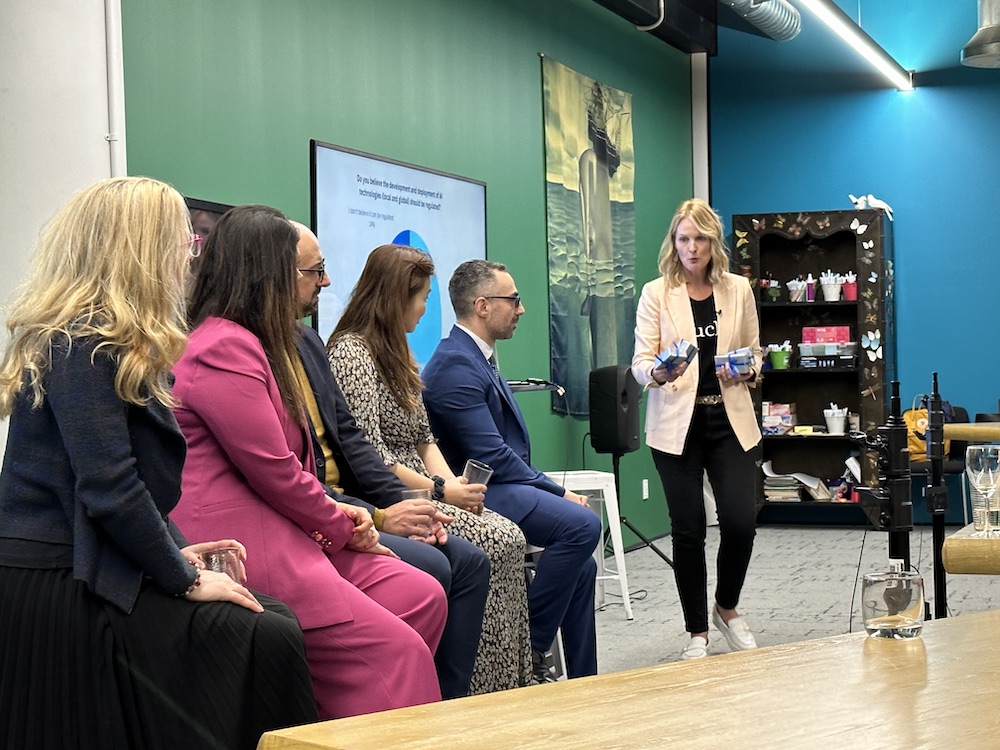The Generative AI panel discussion held at academyEX on the evening of August 3, 2023 offered a range of perspectives on emerging artificial intelligence (AI) technology and what it means for New Zealand. Facilitator Frances Valintine (founder and CEO of academyEX) used the results from a recent survey of New Zealanders about AI as conversation starters for panelists to explore opportunities and challenges in this space. It was nice to see that education ended up being a recurring theme.
Thanks to panelists Giovanni Russello, Husain Al Badry, Madeline Newman, Mahsa McCauley, and Yun Sing Koh for their thoughtful and relevant contributions to this important conversation.
Points I found interesting (organized by theme) included:
Changing Expectations
It’s quickly getting to the point where every company needs a posture on AI, and AI needs to be on every product road map even if the product has nothing to do with AI.
Challenges/Risks
It’s not only the usual bad actors exploiting AI for scams and illegal activity, but big companies may look at unethical AI practices if it helps the bottom line.
Phishing attacks are getting better, and ‘spear-phishing’ is much easier, due to it being easier to imitate a specific person now.
Risk that NZ may end up having to accept whatever the big overseas tech companies dictate due to their scale and power.
In terms of inequality, NZ has gone from being very egalitarian in the 1940s and 50s to one of the most unequal countries, and this gap may be exacerbated by AI.
Upcoming NZ election is all about back to basics; nothing exciting about technology or AI.
Funding
AI was available around seven years ago but not everyone could or can still afford it, so availability is not necessarily the biggest issue.
Over three-quarters of New Zealand businesses are SME’s, most have under 20 staff, and they don’t have capacity or funding to invest in AI.
AI tools might not always be free (e.g. free version of ChatGPT).
There’s not enough funding for research and development in NZ, and universities compete with each other instead of specializing and having leadership in a particular area such as AI.
Education & Professional Development
NZ trails other OECD countries in terms of capability building and professional development.
Idea that NZ should go hard on education and technology, which are much easier to export during a pandemic than agriculture or tourism.
Support for an AI literacy course in primary school.
Acknowledgment of very variable computer literacy in NZ: some students come to university only knowing Microsoft Word, while others come in knowing how to do an Internet of Things (IoT) project.
There’s a question of fairness if some students use AI to do their work and others don’t. The people who overly rely on it are less likely to understand or learn because they’re having the machine do everything.
Concern from audience that even though digital technologies curriculum is now in NZ schools from Year One, it still doesn’t seem to be widely known, and that NZ youth might use AI as a shortcut to not writing essays or not doing mathematics problems.
There’s a potential for an AI tutor to be trained / ringfenced to act like a tutor and guide students, not do the work for them (e.g. Khan Academy’s Khanmigo AI assistant).
News about trying to reduce youth’s screen time: China is proposing strict limits for kids under 18 on how many minutes they can be online a day.
Coming up
AI for the Environment Hackathon Festival will be running throughout August.
The AI forum has a 2020 paper on AI principles that is still relevant, but it also has three working groups that will be discussing their recent work in September at the AI Summit.